PEP 新版小学英语 五年级下册Unit1 My day A Let's learn教案
- 格式:doc
- 大小:26.50 KB
- 文档页数:3
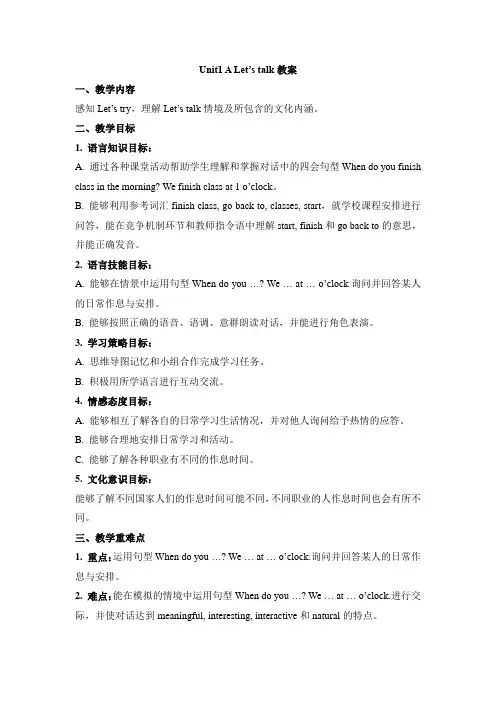
Unit1 A Let’s talk教案一、教学内容感知Let’s try,理解Let’s talk情境及所包含的文化内涵。
二、教学目标1. 语言知识目标:A. 通过各种课堂活动帮助学生理解和掌握对话中的四会句型When do you finish class in the morning? We finish class at 1 o’clock。
B. 能够利用参考词汇finish class, go back to, classes, start,就学校课程安排进行问答,能在竞争机制环节和教师指令语中理解start, finish和go back to的意思,并能正确发音。
2. 语言技能目标:A. 能够在情景中运用句型When do you …? We … at …o’clock询问并回答某人的日常作息与安排。
B. 能够按照正确的语音、语调、意群朗读对话,并能进行角色表演。
3. 学习策略目标:A. 思维导图记忆和小组合作完成学习任务。
B. 积极用所学语言进行互动交流。
4. 情感态度目标:A. 能够相互了解各自的日常学习生活情况,并对他人询问给予热情的应答。
B. 能够合理地安排日常学习和活动。
C. 能够了解各种职业有不同的作息时间。
5. 文化意识目标:能够了解不同国家人们的作息时间可能不同,不同职业的人作息时间也会有所不同。
三、教学重难点1. 重点:运用句型When do you …? We … at …o’clock.询问并回答某人的日常作息与安排。
2. 难点:能在模拟的情境中运用句型When do you …? We … at …o’clock.进行交际,并使对话达到meaningful, interesting, interactive和natural的特点。
四、教学方法及教具情境教学法,交际法,合作教学法PPT课件,人物头饰,竞争机制图。
五、教学过程Step 1: Greetings(设计意图:与学生问好,拉近与学生的距离。
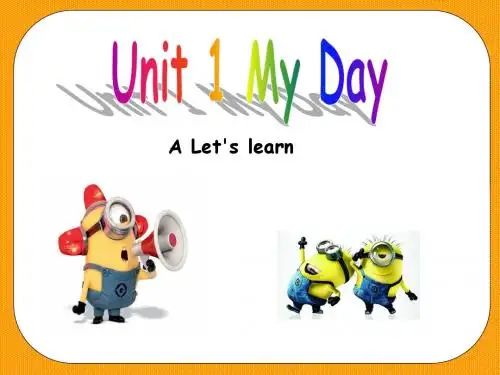
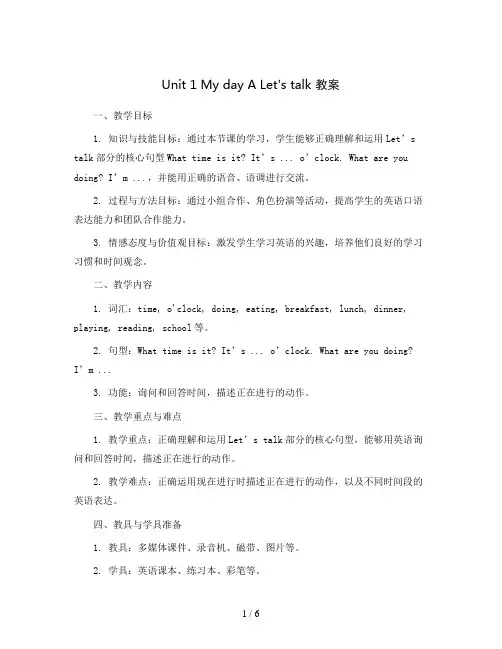
Unit 1 My day A Let's talk 教案一、教学目标1. 知识与技能目标:通过本节课的学习,学生能够正确理解和运用Let’s talk部分的核心句型What time is it? It’s ... o’clock. What are you doing? I’m ...,并能用正确的语音、语调进行交流。
2. 过程与方法目标:通过小组合作、角色扮演等活动,提高学生的英语口语表达能力和团队合作能力。
3. 情感态度与价值观目标:激发学生学习英语的兴趣,培养他们良好的学习习惯和时间观念。
二、教学内容1. 词汇:time, o'clock, doing, eating, breakfast, lunch, dinner, playing, reading, school等。
2. 句型:What time is it? It’s ... o’clock. What are you doing? I’m ...3. 功能:询问和回答时间,描述正在进行的动作。
三、教学重点与难点1. 教学重点:正确理解和运用Let’s talk部分的核心句型,能够用英语询问和回答时间,描述正在进行的动作。
2. 教学难点:正确运用现在进行时描述正在进行的动作,以及不同时间段的英语表达。
四、教具与学具准备1. 教具:多媒体课件、录音机、磁带、图片等。
2. 学具:英语课本、练习本、彩笔等。
五、教学过程1. 热身:播放英语歌曲《What time is it?》,让学生跟随音乐做动作,激发学习兴趣。
2. 导入:展示一张时钟的图片,引导学生用英语询问和回答时间。
3. 新课呈现:通过多媒体课件展示Let’s talk部分的对话内容,引导学生学习核心句型。
4. 操练:组织学生进行小组合作,用核心句型进行角色扮演,提高口语表达能力。
5. 巩固:设计一些与教学内容相关的练习题,让学生独立完成,检查学习效果。
6. 总结:对本节课所学内容进行总结,强调重点和难点。
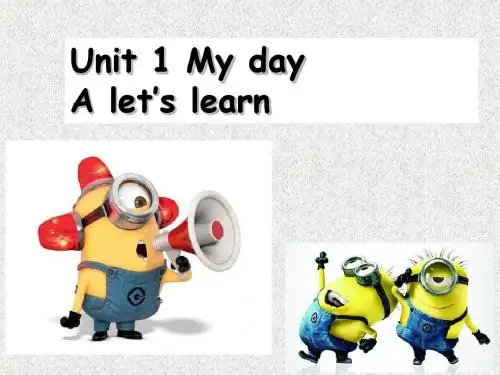
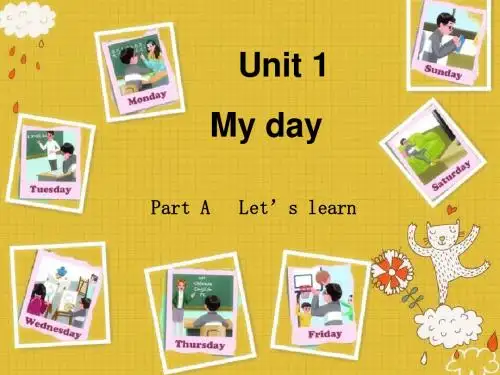
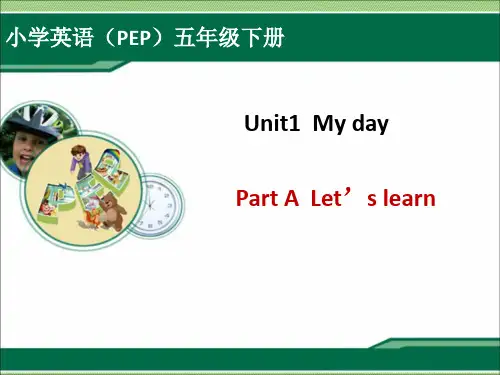
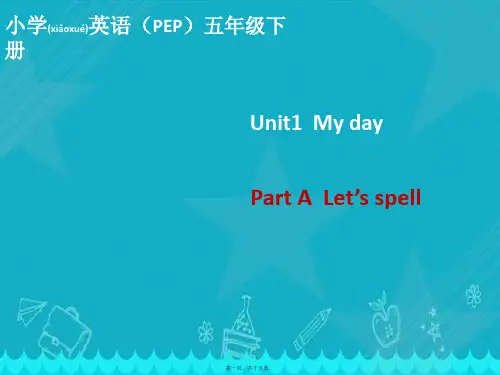
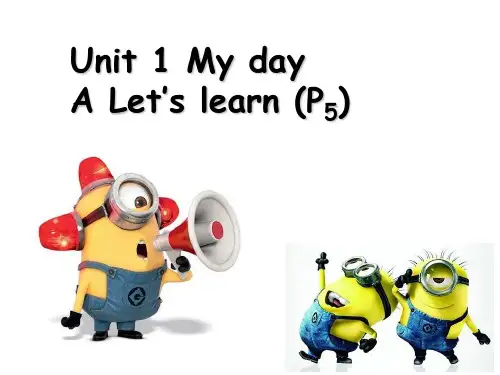

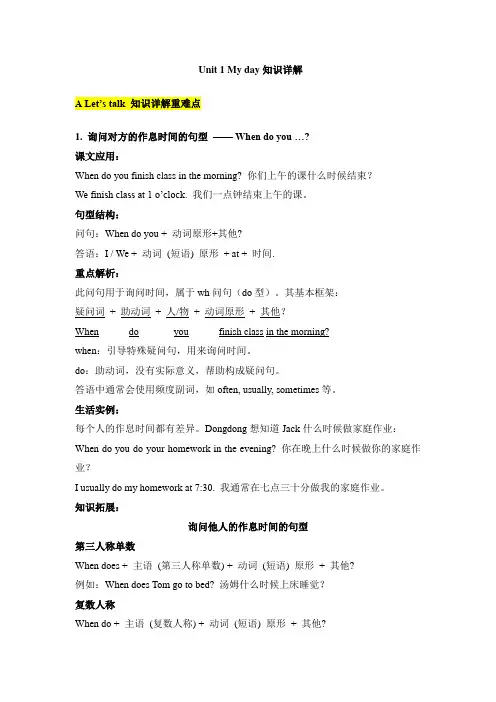
Unit 1 My day知识详解A Let’s talk 知识详解重难点1. 询问对方的作息时间的句型——When do you …?课文应用:When do you finish class in the morning? 你们上午的课什么时候结束?We finish class at 1 o’clock. 我们一点钟结束上午的课。
句型结构:问句:When do you + 动词原形+其他?答语:I / We + 动词(短语) 原形+ at + 时间.重点解析:此问句用于询问时间,属于wh问句(do型)。
其基本框架:疑问词+ 助动词+ 人/物+ 动词原形+ 其他?When do you finish class in the morning?when:引导特殊疑问句,用来询问时间。
do:助动词,没有实际意义,帮助构成疑问句。
答语中通常会使用频度副词,如often, usually, sometimes等。
生活实例:每个人的作息时间都有差异。
Dongdong想知道Jack什么时候做家庭作业:When do you do your homework in the evening? 你在晚上什么时候做你的家庭作业?I usually do my homework at 7:30. 我通常在七点三十分做我的家庭作业。
知识拓展:询问他人的作息时间的句型第三人称单数When does + 主语(第三人称单数) + 动词(短语) 原形+ 其他?例如:When does Tom go to bed? 汤姆什么时候上床睡觉?复数人称When do + 主语(复数人称) + 动词(短语) 原形+ 其他?例如:When do they do morning exercises? 他们什么时候做早操?询问作息时间的其他表达方式询问作息时间还可以用“What time do/does + 主语+ 动词(短语)原形+ 其他?”句型。
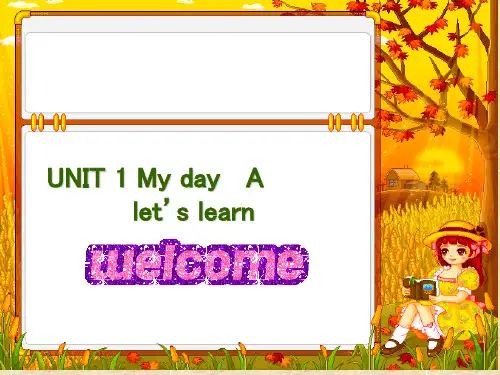
五年级上册文本及词汇朗读资料之五兆芳芳创作Unit 1 My day1. A Let’s talkZhang Peng: When do you finish class in the morning?张鹏:你什么时候上完课?Pedro: We finish class at 1 o’clock.Then we eat lunch at home.佩德罗:我们一点下课.然后我们在家吃午饭.Zhang Peng: Wow!When do you go back to school after lunch?张鹏:哇!午饭后你什么时候回学校?Pedro: At 2:30.Classes start at 3 o’clock.佩德罗:2:30.三点开始上课.Zhang Peng: When do you usually eat dinner in Spain?张鹏:你通常什么时候在西班牙吃晚饭?Pedro: Usually at 9:30 or 10 o’clock.佩德罗:通常在9:30或十点.Zhang Peng: Wow! That’s too late!张鹏:哇!太晚了!2. B Let’s talkSShopkeeper: Why are you shopping today?店主:你今天为什么购物?Sarah: My mum worked last night.So I’m shopping today.莎拉:我妈妈昨晚任务了.所以我今天购物.Shopkeeper: Good girl!So what do you do on the weekend?店主:好女孩!那么你周末做什么?Sarah: I often watch TV and play pingpong with my father.莎拉:我经常看电视,和爸爸打乒乓球.Shopkeeper: That sounds like a lot of fun.店主:听起来很有趣.Sarah: Yes, but I’m also hardworking.I usually wash clothes.Sometimes I cook dinner.莎拉:是的,但我也很勤奋.我通常洗衣服.有时我做饭. Shopkeeper: You’re so busy!You need a robot to help you!店主:你这么忙!你需要一个机械人来帮忙你!3.单词:eat breakfast 吃早饭have … class上……课play sports 进行体育运动exercise 勾当;运动do morning exercises 早锻炼eat dinner 吃晚饭clean my room 打扫我的房间go for a walk 散步go shopping 去买东西;购物take 学习;上(课)dancing 跳舞;舞蹈take a dancing class 上舞蹈课when 什么时候;什么时候after 在(时间)后start 开始usually 通常地;惯常地Spain西班牙late晚;迟a.m. 午前;上午p.m. 午后;下午why 为什么shop 去买东西;购物work 任务last 上一个的;刚过来的sound 听起来仿佛also 还;也busy忙的need 需要play 戏剧;剧本letter 信for 暗示接受某事物的人live 居住island 岛always 总是,一直cave 山洞;洞穴go swimming 去游泳win 获胜4.句子:When do you finish class in the morning?你什么时候上完课?We finish class at 1 o’clock.我们一点下课.what do you do on the weekend?你周末做什么?I often watch TV and play pingpong with my father.我经常看电视,和爸爸打乒乓球. Unit 2 My favourite season1. A Let’s talkMr Jones: Do you like the music, children? 孩子们,你们喜欢音乐吗?Mike: Yes. It’s very beautiful. What is it? 是.它很漂亮.这是怎么一回事?Mr Jones: The Four Seasons.Today we’ll draw the seasons. 四季.今天我们画四季.Which season do you like best, Mike? 迈克,你最喜欢哪个季候?Mike: Winter. I like snow. 冬天.我喜欢雪.Mr Jones: I like snow, too. 我也喜欢雪.Which season do you like best, Wu Yifan? 吴一帆,你最喜欢哪个季候?Wu Yifan: Spring. It’s pretty. 春天.很漂亮.Mr Jones: Yes, it is. 是的,它是.2. B Let’s talkAmy: Hello, Miss White.Look at my picture.你好,White小姐.看我的照片.Miss White: Good job!I like the trees.The colours are very pretty.好!我喜欢树.颜色很漂亮.Amy: Yes. I like autumn best.是.我最喜欢秋天.The weather is good and the colours are beautiful!天气好,颜色很美!Which season do you like beat, Miss White?White小姐,你喜欢哪个季候?Miss White: Summer.夏天.Amy: Why?为什么?Miss White: Because I like summer vacation!因为我喜欢暑假!3. 单词:spring 春天summer 夏天autumn 秋天winter 冬天season 季候picnic 野餐go on a picnic 去野餐pick 摘;收集pick apples 摘苹果snowman 雪人make a snowman 堆雪人go swimming 去游泳which 哪一个best 最好地snow 雪good job做得好because 因为vacation 假期all 全,完全pink 粉色;粉色的lovely 可爱的;美丽的leaf 叶子fall 落下;【美】秋天paint 用颜料绘画4.句子:Which season do you like best, Mike? 迈克,你最喜欢哪个季候?Winter. 冬天.Why?为什么?Because I like summer vacation!因为我喜欢暑假!Unit 3 My school calendar1. A Let’s talkMike: We have a few fun things in spring.我们在春天有一些好玩的东西.After the sports meet, we have an Easter party.运动会之后,我们有一个复生节聚会. Zhang Peng: When is the party?聚会是什么时候?Mike: It’s in April.We have a school trip, too.在四月.我们也有学校旅行.Zhang Peng: When is that?什么时候?Mike: It’s in May.在五月.Zhang Peng: Cool!酷!2 B. Let’s talkOliver: Autumn is my favourite season.秋天是我最喜欢的季候.I really like the colours.我真的很喜欢这些颜色.Chen Jie: I like autumn, too.我也喜欢秋天.We usually have a school trip in autumn.我们通常在秋天有一次学校旅行.Oliver: Great!When is the trip this year?伟大!今年的旅行是什么时候?Chen Jie: It’s in October. We’ll go to the Great Wall. 在十月.我们要去长城.Oliver:Cool!I love the Great Wall!酷!我爱长城!3. 单词:January 一月February 仲春March 三月April 四月May 五月June 六月July 七月August 八月September 九月October 十月November 十一月December 十仲春plant 种植contest 角逐;竞赛year 年few 一些a few 一些thing 事情meet 会议;开会sports meet运动会Easter 复生节trip 旅行national 国度的National Day 国庆日American 美国的Thanksgiving 感恩节Christmas 圣诞节Great Wall 长城holiday 沐日;节日game 游戏roll 转动look for 寻找chocolate 巧克力bunny (用作儿语)兔子RSVP(尤用请柬)请赐复by 在……之前4.句子:When is the party?聚会是什么时候?It’s in April.在四月.When is the trip this year?今年的旅行是什么时候?It’s in October. We’ll go to the Great Wall. 在十月.我们要去长城.Unit 4 When is Easter?1.A. Let’s talkMr Jones: There are some special days in April.四月有一些特殊的日子.Zhang Peng: What are they?他们是什么?Mr Jones: April Fool’s Day and Easter.四月愚人节和复生节.Zhang Peng: When is April Fool’s Day?四月愚人节是什么时候?Mr Jones: It’s on April 1st.4月1日.Zhang Peng: And Easter?复生节呢?Mr Jones: It’s on April 5th this y ear.今年4月5日.Zhang Peng: Wow! I love April.哇!我爱四月.2. B. Let’s talkChen Jie: When is your birthday?你的生日是什么时候?Mike: My birthday is on April 4th.我的生日是4月4日.Chen Jie: That’s my mother’s birthday, too!那也是我妈妈的生日!Mike: Cool! What will you do your mum?酷!你妈妈会做什么?Chen Jie: I’ll cook noodles for her.我会为她做面条.Mike: Chinese noodles are delicious!中国面条好吃!Chen Jie: Please come then. 请过来.We can have a birthday party for both of you!我们可以为你们俩举行一个生日聚会!3. 单词:first (1st)第一的second (2nd)第二的third (3rd)第三的fourth (4th)第四的fifth (5th)第五的twelfth (12th)第十二的twentieth (20th)第二十的twentyfirst (21st)第二十一的twentythird (23rd)第二十三的thirtieth (30th)第三十的fool 蠢人;傻瓜special 特此外;特殊的kitten 小猫diary 日记still 仍然;依旧;仍是noise 声音;响声(尤指)噪音fur (某些动物的)浓密的软毛open 开着的walk 行走4. 句子:When is April Fool’s Day?四月愚人节是什么时候?It’s on April 1st.4月1日.When is your birthday?你的生日是什么时候?My birthday is on April 4th.我的生日是4月4日.Unit 5 Whose dog is it?1. A Let’s talkChen Jie: The yellow picture is mine.黄色图片是我的.Are these all ours?这些都是我们的吗?Mike: Yes, they are.是的,它们是.Chen Jie: Wow! That picture of Beijing is beautiful.哇!北京的照片很美.Whose is it?这是谁的?Mike: It’s Zhang Peng’s.是张鹏的.Chen Jie: Look! There is a picture of Shanghai, too.看!也有一幅上海的画.Mike: It’s Yifan’s.是一帆的.Chen Jie: Oh, yes! It’s his.哦,是的!这是他的.2. B. Let’s talk(Sam is at Chen Jie’s home.)(山姆在陈洁家.)Sam: Where is Fido now?Fido现在在哪里呢?Chen Jie: He’s in the kitchen.他在厨房里.Sam: Is he drinking water?他在喝水吗?Chen Jie: No, he isn’t.He’s eating.不,他不是他在吃饭.Sam: Can I play with him now?我现在可以和他一起玩吗?Chen Jie: Yes. Can you take him to the park?是.你能带他去公园吗?Sam: Woof, woof!Woof,汪!3. 单词:mine 我的yours 你(们)的his 他的hers 她的theirs 他们的;她们的;它们的ours 我们的climbing (climb的ing形式)(正在)攀登;攀爬eating(eat的ing形式)(正在)吃playing(play的ing形式)(正在)玩耍jumping(jump的ing形式)(正在)跳drinking(drink的ing形式)(正在)喝(水)sleeping(sleep的ing形式)(正在)睡觉each 每一;各个other 其他的each other 相互excited 兴奋的;冲动的like 像……那样4.句子:The yellow picture is mine.黄色图片是我的.Are these all ours?这些都是我们的吗?Whose is it?这是谁的?It’s Zhang Peng’s.是张鹏的.Is he drinking water?他在喝水吗?No, he isn’t.He’s eating.不,他不是他在吃饭.Unit6Work quietly!1. A. Let’s talkChen Jie: Look at the pandas.看熊猫.Mike: What are they doing?他们在干什么?Chen Jie: Haha. They’re eating lunch!Haha.他们正在吃午餐!They’re so cute.他们是如此可爱.Mike: Oh, yes! They like bamboo.哦,是的!他们喜欢竹子.Chen Ji e: What’s the little monkey doing?小山公在干什么?Mike: it’s playing with its mother!和妈妈玩!Chen Jie: Do you see any elephants?你看见大象了吗?Mike: Yes! Look there!The elephant is drinking water.是!看那里!大象正在喝水.2. B. Let’s talkTom: My name is Tom.What’s your name?汤姆:我叫汤姆.你叫什么名字?John: Shh. Talk quietly.I’m John.嘘.小声说话.我是约翰.I can show you the English books.我可以给你看英文书.Tom: Thanks.谢谢.John: Here they are.他们在这里.Tom: OK. Can I read the books here?好的.我能在这儿读这些书吗?John: Yes. Of course.是.当然.Tom: Anything else?还有此外吗?John: Yes. Keep your desk clean.是.保持桌面洁净.Tom: OK, I will.Thanks.好的,我会.谢谢.3. 单词:doing morning exercises(正在)早锻炼having … class(正在)上课eating lunch(正在)吃午饭reading a book(正在)看书listening to music(正在)听音乐keep保持某种状态keep to the right靠右keep your desk clean 保持你的课桌整洁talk quietly 小声讲话turn 顺序take turns 按顺序来bamboo 竹子its它的;他的(指事物、动物或幼儿)show 引导;指引anything 任何事物else 另外;其他exhibition 展览say 说;讲have a look 看一看sushi 寿司teach 教Canadian 加拿大的Spanish 西班牙的4. 句子:What are they doing?他们在干什么?Haha. They’re eating lunch!他们正在吃午餐!What’s the little monkey doing?小山公在干什么?it’s playing with its mother!和妈妈玩!Shh. Talk quietly.嘘.小声说话.Keep your desk clean.保持桌面洁净.。
五年级上册文本及词汇朗读资料Unit 1 My day1. A Let’s talkZhang Peng: When do you finish class in the morning?张鹏:你什么时候上完课?Pedro: We finish class at 1 o’clock.Then we eat lunch at home.佩德罗:我们一点下课。
然后我们在家吃午饭。
Zhang Peng: Wow!When do you go back to school after lunch?张鹏:哇!午饭后你什么时候回学校?Pedro: At 2:30.Classes start at 3 o’clock.佩德罗:2:30。
三点开始上课。
Zhang Peng: When do you usually eat dinner in Spain?张鹏:你通常什么时候在西班牙吃晚饭?Pedro: Usually at 9:30 or 10 o’clock.佩德罗:通常在9:30或十点。
Zhang Peng: Wow! That’s too late!张鹏:哇!太晚了!2. B Let’s talkSShopkeeper: Why are you shopping today?店主:你今天为什么购物?Sarah: My mum worked last night.So I’m shopping today.莎拉:我妈妈昨晚工作了。
所以我今天购物。
Shopkeeper: Good girl!So what do you do on the weekend?店主:好女孩!那么你周末做什么?Sarah: I often watch TV and play ping-pong with my father.莎拉:我经常看电视,和爸爸打乒乓球。
Shopkeeper: That sounds like a lot of fun.店主:听起来很有趣。
一、教学目标
1.能够听、说、读、写以下动词短语:eat breakfast, do morning exercises, have…class, play sports, eat dinner.
2.能够听懂问句:When do you do morning exercises / …? 并能用所学动词短语替换句型“A t …”中的关键词回答问句。
3.能理解并跟唱Let’s sing的歌谣。
二、教学重、难点
1.本课时的教学重点是掌握A部分Let’s learn中的五个动词短语,并能用这五个短语回答询问作息时间的问题。
2.本课时的教学难点是掌握五个四会短语和单词exercises的正确发音。
1、Let’s sing《Ten candles》,听并跟唱三年级上册第六单元歌曲复习数字,为本节课时间表达做铺垫。
2、Free talk:复习上节课重点内容。
S1:When do you get up?
S2:I get up at 5 o’clock.
S1: When do you…?
S2: I… at…o’clock.
1、由Free talk环节自然引入Prdro的时间安排,T:How about Pedro’s
chedule? Let’s watch together.利用PPT出示本课Let’s learn内容,请学生仔细观察,猜测词组意思,并鼓励生大胆说出学过的或认识的单词。
Eg: do, morning, have, class, play, dinner.
2、师根据学生记忆规律,由易到难,打破顺序,组合讲解:
①have English class
have Chinese class have … class并举例拓展。
have PE class…
②play football play sports
play basketball horse fork 辅助记忆
③tea break(head)
read eat breakfast
peach fast
拓展:eat lunch\dinner
④e+xer+ci_se+s分音节讲解,并请生标注,突破难点发音。
3、学习上述词组时穿插入句型-When do you…? –At…o’clock.词不离句,帮助记忆,并适时加入书写,加深记忆。
4
1、Listen and repeat
2、Read by themselves
3、看谁说得快;
请生利用句型将词组替换,快速说完五组对话,时间最短者获胜。
Ask and write:
将同学分成若干组,在小组内选一人在黑板上画一个大时钟,将指针指向6:00,问“When do you get up? ”,小组内其他同学回答“I getup at 6:00 a.m.”,然后指向另一个时间问其他活动在何时进行,让其他同学回答,比比看,看哪一小组回答的既准确又迅速。
1、Ex.
2、Summary
3、Homework。